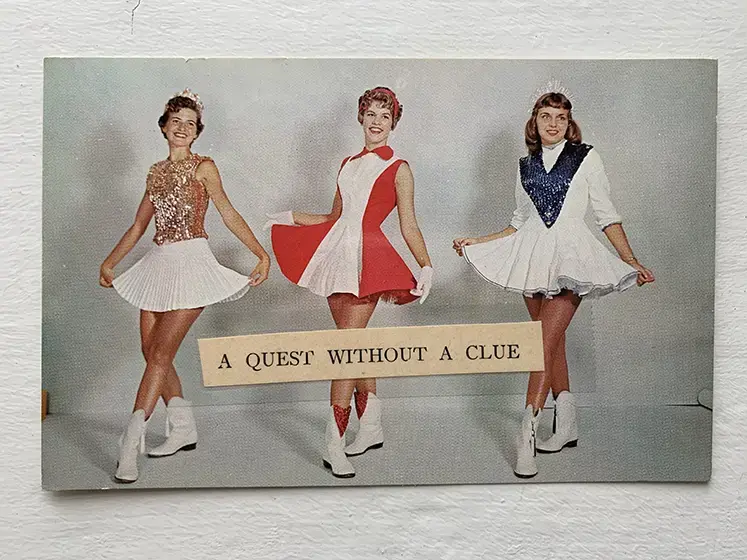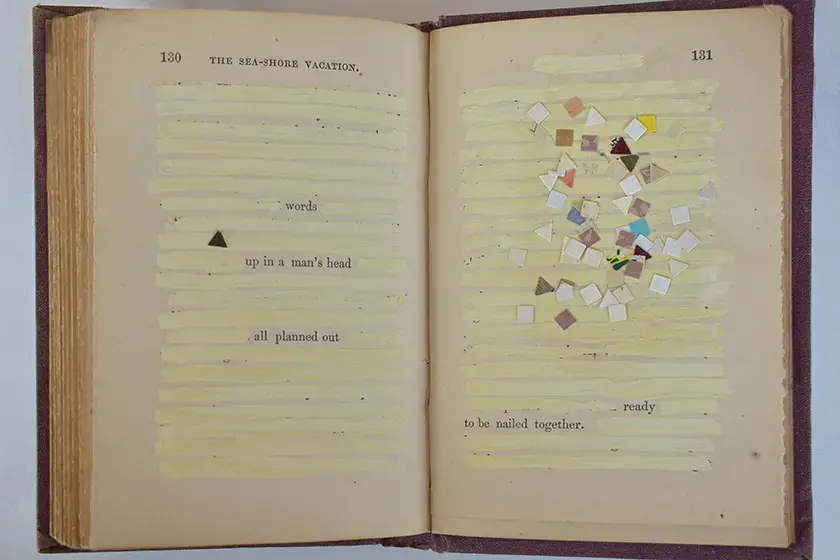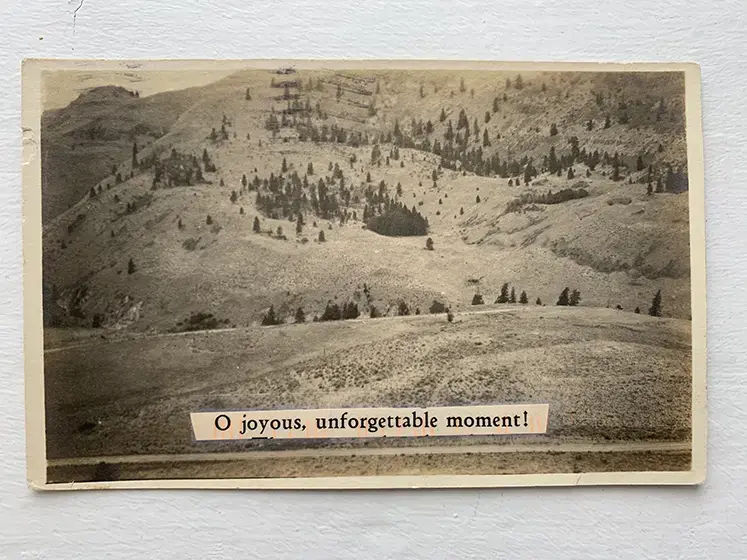Vermont State Poet Laureate Mary Ruefle’s Erasures Exhibition Featured at Robert Frost Stone House Museum
Mary Ruefle: Erasures, the first solo exhibition of visual work by Vermont State Poet Laureate Mary Ruefle ’74, is currently on view at the Robert Frost Stone House Museum.
Mary Ruefle: Erasures runs at the Museum through the end of October. An opening reception with Ruefle will be held on August 20 from 4:00-6:00 pm. This reception is free and open to the public.
Additionally, on August 18 from 4:00-5:00 pm, Mary Ruefle will be participating in a Facebook Live interview with Mark Wunderlich, director of the Bennington Writing Seminars, about the exhibition.
This exhibition is co-curated by Erin McKenny, director of the Robert Frost Stone House Museum, and Mark Wunderlich.
“It has been a great privilege for us to assemble this work and to work closely with Mary,” said co-curators Erin McKenny and Mark Wunderlich. “The work on view represents decades of painstaking and deeply original artistic practice, and Mary is truly one of the real geniuses of the genre of erasure texts. The work is witty, poignant, sometimes melancholy, and always beautiful and interesting.”
The Robert Frost Stone House Museum is open Thursday through Monday, 10:00 am-4:00 pm. Masks are encouraged for unvaccinated visitors. For Museum admission rates and driving directions, visit the website.
In connection with Mary Ruefle: Erasures, the John G. McCullough Library in North Bennington is offering children Erasure Poetry Kits, so they, too, can find poems hidden in newspaper and magazine articles. Kits are available for pickup at the library from July 28 - August 30 and include a free pass to the Robert Frost Stone House Museum. For more information, please call the library at 802-447-7121.
About Mary Ruefle: Erasures
Beginning in 1998 and continuing as part of her ongoing work, Vermont State Poet Laureate Mary Ruefle has produced a series of altered books from which she creates poetic texts in a process called “erasure,” which Ruefle has defined as an act of “creating a new text by disappearing the old text that surrounds it.”
Using correction fluid, markers, and gouache, and often incorporating collaged found images, the original texts are partially covered over to reveal new and surprising voices, phrases, narratives, and fragmented poems.
As part of the exhibition, Ruefle’s postcard collages, altered books, and erasures blend images and text, creating new poetic artifacts that establish a counterpoint between verbal and visual syntax. Her work extends the Modernist project that includes the collage artists Hannah Hoch, Joseph Cornell, and Alexander Rodchenko.
Publishers Weekly, in a starred review, described Ruefle’s book of erasures, A Little White Shadow, as containing, “haiku-like mini-fables, sideways aphorisms, and hauntingly perplexing koans.”



About Mary Ruefle
Poet, writer, essayist, and visual artist, Mary Ruefle is the author of over a dozen books of poems, essays, and short fiction, including Dunce (2019), which was a finalist for the National Book Critics Circle Award and the 2020 Pulitzer Prize, My Private Property (2016), Indeed I Was Pleased with the World (2007), and The Adamant (1989), which won the Iowa Poetry Prize. She is also the author of the essay collection Madness, Rack, and Honey (2012), the work of fiction The Most of It (2008), and A Little White Shadow (2006), a book of erasures. A full-color facsimile of her erasure An Incarnation of the Now was published in a limited edition by See Double Press.
A graduate of Bennington College, where she studied literature, and a resident of Bennington, Vermont, Ruefle is the recipient of numerous honors, including an Award in Literature from the American Academy of Arts and Letters, a Guggenheim Fellowship, a National Endowment for the Arts Fellowship, and a Whiting Award.
Since her appointment as Vermont State Poet Laureate, Mary Ruefle has undertaken a project to mail one thousand poems to one thousand Vermonters in “random acts of poetry.” Sent anonymously and with no explanation, the poems are meant to surprise, possibly to delight, and to create, “a moment of attention in a day which otherwise might be lost to ceaseless activity,” as Ruefle said in an interview with Vermont Public Radio.
In an interview with The Paris Review, Ruefle is quoted as saying, “I think there’s always a certain amount of invisibility when you write. You’re alone in a room, no one is looking over your shoulder. When I was young, writing was the one invisible space I had, and it made me very happy because I could become invisible while writing. I still feel this way, except there’s much less of a difference between my inner, creative life and my outer life than when I was young. And that’s a joyful thing!”